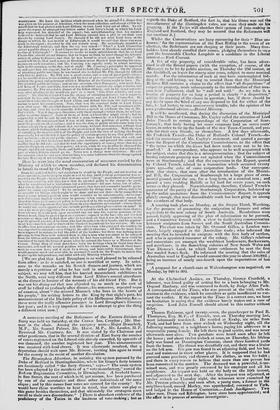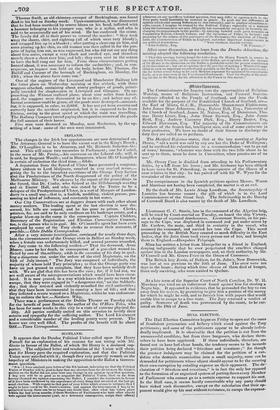At the Chelmsford Assizes, on Thursday, George Cranfield, a labourer,
was found guilty of setting fire to a barn belonging to Mr. Osgood Hanbury, and was sentenced to death, by Judge Allan Park. A correspondent of the Times, who was present at the trial, calls at. tention to the evidence, which he considers as quite insufficient to war- rant the verdict. If the report in the Times is a correct one, we have no hesitation in saving that the evidence barely makes out a case of suspicion. Lord John Russell should attend to this matter without delay.
Thomas Robinson, aged twenty-seven, the gamekeeper to Paul B. Thompson, Esq. M. P., of Escriek, was, on Thursday morning last, • most inhumanly mindere& He resided at Kexby, six miles from York, and had been from nine o'clock on Wednesday night, till the following morning, at a neighbour's house, paying his addresses to a respectable young female. He left there in good spirits, and was never afterwards seen alive. Two gunshots were heard soon after he left the house ; and about twelve o'clock at noon, on Thursday, his lifeless body was found on Dunnington Common, about three hundred yards from the house. His throat was dreadfully cut, and there was a bruise on the left arm. f i is gun was found in an adjoining field, and his hat, coat and waistcoat in three other places. It is supposed that he had pursued some poachers, and thrown of his clothes, as was his habit ; and there is every reason to believe that more than one person has been concerned in the murder. The deceased was a powerful, deter- mined man, and was greatly esteemed by his employer and all his neighbours. An inquest was held on the body on the 16th instant, and adjourned to the next day. After the inquest was adjourned, at twelve o'clock on Thursday night, the witnesses were examined by Mr. Preston privately; and soon after, a young man, a farmer in the neighbourhood, named Morley, was apprehended, conveyed to York, and lodged in the House of Correction.—Leeds Intelligencer. Two other men, Dunn and Kilvingtota have since been apprehended; and the affair is in process of anxious investigatior. Thomas Swift, an old chimney-sweeper of Buckingham, was found dead in his bed on Sunday week. Upon examination, it was discovered that he had been murdered by severe blows on his head, inflicted with a hammer belonging to his younger son, who is a nailor, and who is said to be occasionally out of his mind. He has confessed the crime. The family did all in their power to conceal the murder: " they took away the sheets, shirt, and nightcap (all of which were very bloody), and wrapped him up in a blanket ; after putting a clean cap on him, and even pinning up his chin, an old woman was then called in for the pur- pose of laying him out, as was expressed, but who did not see any thing about him amiss, except a very black and swelled eye, and therefore merely threw a sheet over him, and left ; they even sent to the sexton to have the bell rung out for him. From these circumstances getting buzzed about, it was necessary to inform the authorities ; and, in con- sequence, an inquest was held on the body, before Mr. Thomas, the Bailiff and Coroner of the borough of Buckingham, on Monday, the 13th ; when the above facts came out."
One of the engines of the Liverpool and Manchester Railway left the hater place on Wednesday morning at five o'clock, with three waggons attached, containing about ninety packages of goods, princi- pally intended for shopkeepers in Liverpool and Glasgow. On ap- proaching the Whiston inclined plane, about nine miles from Liver- pool, the waggons were discovered to he on fire ; and before any ef- fectual assistance could be given, all the goods were destroyed—amount- ing, it is supposed, in value, to 2,0001. It has not yet been ascertai ned correctly how the accident originated, but it is supposed to be from friction, owing to the great speed at which the train was travelling. The Railway Company intend paying the respective owners of the goods the full amount of their losses.
Five men were drowned on Monday, near Rochester, by the up- setting of a boat : some of the men were intoxicated.



























 Previous page
Previous page